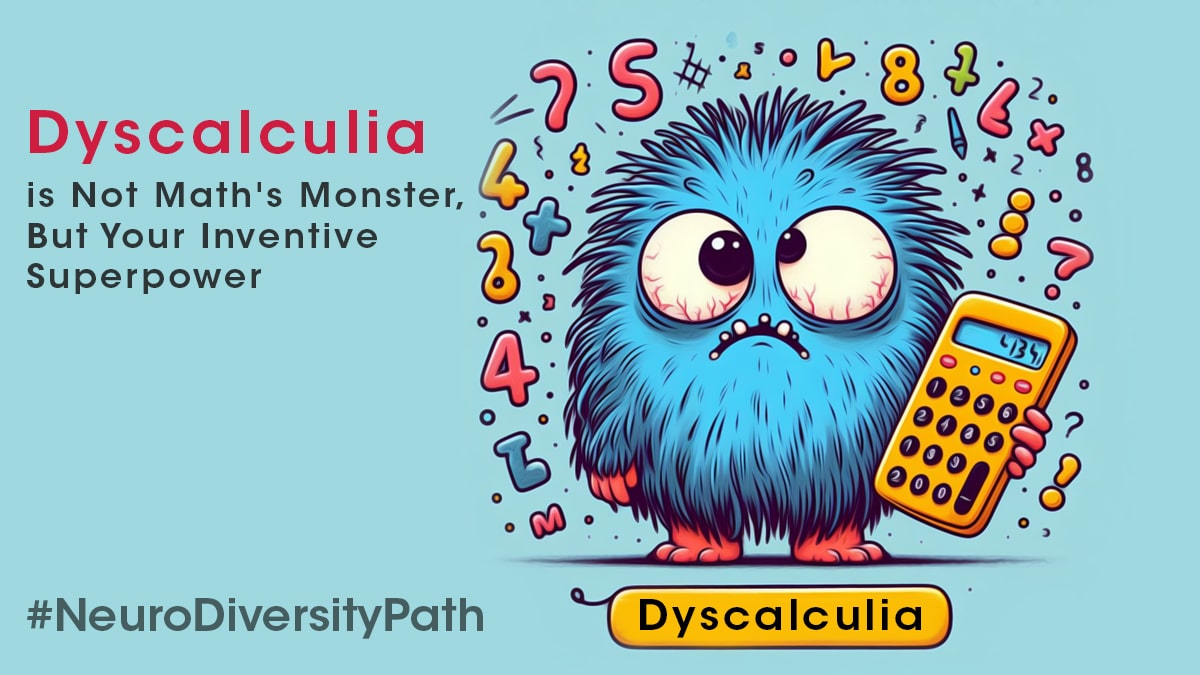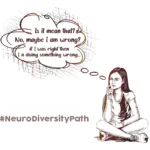Have you ever felt like numbers and equations are a foreign language? If math has always seemed like a monster lurking in your textbooks, you’re not alone. But what if I told you that your struggles with numbers could be the key to unlocking a unique and inventive superpower?
Welcome to a journey where we reframe dyscalculia not as a curse but as a hidden strength. By the end of this blog post, you’ll discover how to turn your mathematical challenges into creative advantages and embrace your true potential. Let’s transform your perspective and unleash your inventive superpower.

Breaking the Myth of the Math Monster
Many people view dyscalculia as a crippling obstacle, but this is a misconception. Dyscalculia is not a sign of low intelligence or laziness. It is a specific learning difference that affects how people process numbers. Understanding this is the first step toward overcoming the fear of math. By recognizing dyscalculia as a unique challenge, individuals can seek appropriate support and accommodations to help them succeed in mathematical tasks. This understanding fosters a more inclusive and supportive learning environment.
Through targeted interventions and strategies tailored to their needs, individuals with dyscalculia can build confidence and proficiency in mathematical concepts. This proactive approach empowers them to overcome obstacles and achieve their academic and personal goals. By reframing dyscalculia as a difference rather than a deficiency, society can promote acceptance and understanding, creating opportunities for individuals with dyscalculia to thrive in various domains of life.
To break the myth, it’s essential to recognize that everyone learns differently. Traditional methods might not work for you, but that doesn’t mean you can’t excel in math. Seek out alternative strategies and tools tailored to your unique learning style. Visual aids, hands-on activities, and apps designed for dyscalculia can make a significant difference.
Self-awareness and self-compassion are key. Accept that it’s okay to struggle with math and that it doesn’t define your abilities. Celebrate your progress, no matter how small. Remember, dyscalculia is just one part of who you are and can be managed with the right approach.
The Hidden Strengths of a Dyscalculic Mind
While dyscalculia presents challenges, it also brings unique strengths. Many individuals with dyscalculia excel in creative thinking and problem-solving. Their brains often find unconventional solutions, seeing patterns and connections others might miss. Embracing these strengths can boost confidence and open new opportunities.
Focus on areas where you naturally excel. Many dyscalculic individuals thrive in art, music, writing, and design. These strengths are valuable and can lead to fulfilling careers. Recognize and nurture these talents, allowing them to shine alongside your efforts to improve math skills.
Build a support network. Surround yourself with people who understand your challenges and strengths. Teachers, mentors, and peers can provide encouragement and resources. You can navigate the world more effectively and confidently by acknowledging and leveraging your unique abilities. Remember, your dyscalculic mind is not a limitation but a source of hidden strengths waiting to be unleashed.
Turning Challenges into Opportunities
Embracing dyscalculia means turning challenges into opportunities. A study by Dr. Jo Boaler from Stanford University highlights that individuals with learning differences often develop remarkable resilience and innovative thinking. This resilience can be a powerful asset in various aspects of life. By embracing their unique cognitive styles and seeking out strategies that work for them, individuals with dyscalculia can tap into their strengths and find creative solutions to problems.
Furthermore, embracing dyscalculia encourages a shift in perspective from viewing it as a limitation to recognizing it as a valuable part of one’s identity. This shift empowers individuals to advocate for themselves, seek support when needed, and confidently pursue their goals. Through this process of self-discovery and acceptance, individuals can unlock their full potential and make meaningful contributions to their communities and society as a whole.
Identify the areas where you struggle the most and seek targeted support. For example, use technology like specialized apps and tools to aid mathematical comprehension. These resources can transform difficult tasks into manageable ones, allowing you to progress steadily.
Adopt a growth mindset. View challenges as opportunities to learn and grow rather than as insurmountable obstacles. This mindset, advocated by Dr. Carol Dweck of Stanford University, helps build persistence and adaptability, which are crucial for overcoming difficulties.
Celebrate small victories. Each step forward, no matter how small, is a success. Acknowledge and reward your progress, fostering a positive and proactive approach to your dyscalculia.
Dyscalculia as a Superpower
Considering dyscalculia as a superpower involves acknowledging and embracing the distinctive cognitive strengths it bestows upon individuals. Due to the necessity to seek alternative pathways for comprehending intricate concepts, those with dyscalculia frequently cultivate remarkable problem-solving capabilities. These skills prove particularly advantageous in professions that demand creative and innovative thinking. By harnessing their unique cognitive approach, individuals with dyscalculia can offer fresh perspectives and unconventional solutions to challenges. The ability to think outside the box is highly prized in various fields, such as technology, engineering, and design. Therefore, viewing dyscalculia through the lens of a superpower not only empowers individuals but also highlights the valuable contributions they can make to diverse industries. Embracing this perspective fosters self-confidence and encourages individuals to leverage their strengths to pursue their goals.
Leverage your creative strengths in various areas of life. Whether in the arts, technology, or entrepreneurship, your ability to think outside the box can lead to groundbreaking ideas and solutions. Steve Jobs once said, “Creativity is just connecting things,” your unique perspective can help you make those connections in extraordinary ways.
Advocate for yourself and educate others. Sharing your experiences and strategies can raise awareness about dyscalculia and help others understand its strengths. This advocacy empowers you and creates a supportive community that values diverse thinking. Remember, your dyscalculia is not a hindrance but a superpower that sets you apart.
Practical Tips for Embracing Your Unique Abilities
Embracing your unique abilities starts with practical steps to manage dyscalculia effectively. Create a supportive learning environment using tools and resources tailored to your needs. Apps like Dyscalculator and Khan Academy can help simplify complex concepts and provide personalized learning experiences.
Develop strong organizational skills. Use planners, calendars, and visual aids to keep track of assignments and deadlines. Breaking tasks into smaller, manageable steps can prevent feeling overwhelmed and improve productivity.
Seek out mentors and join support groups. Connecting with others who understand dyscalculia can provide valuable advice and encouragement. Mentors can offer guidance, while support groups offer a sense of community and shared experiences.
Practice self-care and patience. Understand that progress might be slow and setbacks will happen. Taking care of your mental and emotional well-being is crucial. Celebrate your efforts and stay patient with yourself, recognizing that every step forward is a victory in your journey.
Innovative Learning Strategies for Dyscalculia
Innovative learning strategies have the potential to revolutionize the way dyscalculia is approached. Integrating multisensory learning techniques into your educational journey can significantly improve comprehension and memory retention. These methods focus on engaging various senses simultaneously, which benefits individuals struggling with abstract mathematical concepts. For instance, employing physical objects for counting or sketching diagrams can render complex ideas more accessible and concrete. Moreover, these techniques foster a deeper connection with the subject matter, enabling learners to grasp mathematical principles more effectively. By embracing such approaches, individuals with dyscalculia can overcome hurdles in their learning process and develop a stronger foundation in mathematics. This holistic approach enhances academic performance and boosts confidence and motivation in tackling mathematical challenges.
Utilize technology to your advantage. Educational apps and online platforms, like Photomath and Mathway, provide interactive and visual explanations of mathematical problems. These tools can offer instant feedback and step-by-step solutions, helping you grasp difficult concepts more effectively.
Collaborate with educators who understand dyscalculia. Work with teachers to develop individualized learning plans that accommodate your unique needs. They can adapt teaching methods and provide additional resources to support your learning journey.
Embrace a hands-on approach to learning. Practical math applications in real-life scenarios, such as cooking or budgeting, can make learning more relevant and engaging. Connecting math to everyday activities can improve comprehension and make learning more enjoyable.
Embracing Your Mathematical Journey
Embracing your mathematical journey entails recognizing the significance of progress and effort. Establishing feasible goals that allow you to monitor your advancement effectively is essential. Breaking down larger objectives into smaller, more manageable tasks is key to navigating your journey successfully. Each milestone you achieve deserves acknowledgment as it contributes to your overall progress and boosts confidence. Celebrating these smaller victories reinforces your commitment to the learning process. Moreover, this practice is a source of motivation, propelling you forward in your mathematical endeavors. Remember, every step forward, no matter how small, is a testament to your dedication and perseverance. By embracing this mindset, you cultivate a positive attitude towards learning mathematics, fostering continuous growth and development.
Stay persistent and resilient in the face of challenges. Understand that setbacks are a natural part of learning, especially with dyscalculia. Instead of viewing mistakes as failures, see them as opportunities for growth. Learning from errors can provide valuable insights and strengthen your understanding of mathematical concepts.
Surround yourself with a positive support system. Family, friends, educators, and peers who understand and encourage your journey can make a significant difference. Share your successes and challenges with them, and let their support fuel your determination. Embracing your unique path and staying committed can turn your mathematical journey into a rewarding and empowering experience.
“Strength does not come from winning. Your struggles develop your strengths. When you go through hardships and decide not to surrender, that is strength.”
Arnold Schwarzenegger
Reflecting on the journey from seeing dyscalculia as a monster to recognizing it as a superpower has been empowering. We’ve explored the myths surrounding dyscalculia and uncovered hidden strengths. We discussed how to turn challenges into opportunities and view dyscalculia as a unique advantage. Practical tips and innovative learning strategies were shared to help you embrace your abilities and progress in your mathematical journey.
Your path with dyscalculia is not a limitation but an opportunity to discover new ways of thinking and learning. You can transform difficulties into creative solutions and personal growth by understanding and leveraging your unique strengths. Remember, every step forward, no matter how small, is a victory worth celebrating.
What has been your experience with dyscalculia? Share your thoughts and insights in the comments below. Your story could inspire and help others on their journey.





